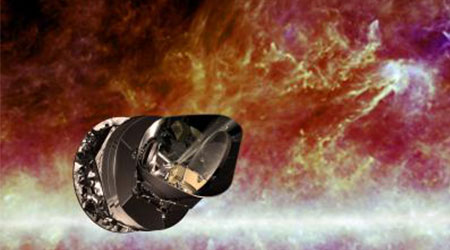Planck Collaboration receives Gruber Prize in Cosmology

Congratulations to the Planck team, and its Principal Investigators Nazzareno Mandolesi and Jean-Loup Puget, for receiving the 2018 Gruber Cosmology Prize. Professor Douglas Scott from UBC Department of Physics & Astronomy was a Co-Investigator and member of the Editorial Board for Planck, who was among the indetified team members who shared the prize. Other members of the full team who are currently at UBC are Research Fellow Dr. James Zibin and graduate student Dagoberto Contreras. Additionally, several postdocs, graduate students and undergraduates at UBC have contributed to Planck over the past 20 years, working on a large variety of tasks, including software, simulations, testing for systematic effects in the data, and scientific analysis for many of the Planck papers.
From 2009 to 2013 the European Space Agency’s Planck observatory collected data that has provided cosmology with the definitive description of the universe on the largest and smallest scales. It offers an order-of-magnitude improvements in sensitivity in Cosmic Microwave Background (CMB) data collection, reaching the precision threshold in measurement to end a phase in CMB studies that was started by COBE in 1992. It also provides a new census of the composition of the Universe: 26.8 percent dark matter, 68.3 percent dark energy, and 4.9 percent ordinary matter. The observatory also found extremely robust evidence that the geometry of the universe is “flat”—that parallel lines truly never meet—a pre-condition for leading theories of the formation and structure of the universe.
But not only did Planck vastly improve the study of the fluctuations in the CMB that, moving forward in time, would grow into the universe as we know it, Planck also achieved greater resolution in tracing those fluctuations back in time, all the way to their origins—the theoretical moment, one trillionth of a trillionth of a trillionth of a second after the universe came into existence, during which space went through an “inflationary” stage that stretched its size a trillion-fold. (Alan Guth and Andrei Linde received the 2004 Gruber Prize in Cosmology for developing the theory of cosmic inflation.)
In addition to the cash award, each recipient will receive a gold laureate pin and a citation that reads:
The Gruber Foundation is pleased to present the 2018 Cosmology Prize to the Planck Team, and to Jean-Loup Puget and Nazzareno Mandolesi, the leaders of the HFI and LFI instrument consortia, for mapping the temperature and polarization of the cosmic microwave background radiation with the ESA Planck spacecraft.
Planck measured, with unprecedented precision, the matter content and geometry of the universe, the imprint on the CMB of hot gas in galaxy clusters and of gravitational lensing by large-scale structure, constrained a hypothetical `inflationary' phase, pinned down when the first stars formed, and provided unique information about interstellar dust and magnetic fields in our Galaxy.